
Treat Me Like Dirt
Interview with Liz Worth
By Christopher Duda
(SugarBuzz Toronto)
SugarBuzz Magazine
Every once in awhile a book lands in my supple, slender fingers that I simply cannot put down. It becomes an appendage or a growth that grows out of my body. I have perfected the art of walking while reading in rush hour! Now, that is an art in itself! Regardless, this is one of those books! Liz Worth has birthed a book that will be and has become the sounding board for the history of Toronto Punk (and lest not forget Hamilton the greatest rock and roll city in Ontario). 1-2-3-4!!! Go!
Did Legs McNeil’s book “Please Kill Me-The Uncensored Oral History of Punk” influence you to use the same formatting in your book?
Oh, yes, of course. I think Please Kill Me is a perfect example of what an oral history can capture, which is everything raw, subjective, and emotional. Many  of those things can fall away when a music history focuses too much on the production values of an album or whatever. When I’m interested in a band, I’m interested in their life story. I want to know not only what’s going on with them internally, but externally through the streets they walk down, the people they hang out with, and the men or women they love, which are all pieces that can be beautifully uncovered in an oral history.
of those things can fall away when a music history focuses too much on the production values of an album or whatever. When I’m interested in a band, I’m interested in their life story. I want to know not only what’s going on with them internally, but externally through the streets they walk down, the people they hang out with, and the men or women they love, which are all pieces that can be beautifully uncovered in an oral history.
I think Please Kill Me did a wonderful job of capturing that and more; its popularity is a no-brainer. Another book that I drew inspiration from was Edie Sedgwick’s biography by Jean Stein.
I think both of those works have really endeared people to the oral history format.
Who was the hardest subject to track down and was there any people from that scene that you were not able to locate? Were there bands that you were unable to locate (i.e.-Arson Etc?)
There were some people who were on the scene, but weren’t musicians, that I was really interested in talking to, like this guy who called himself Mr. Shit. I didn’t know his real name and many people I asked didn’t know it, either. I had to look around for him for a while. Finally, I found him at a Bahá'í Faith 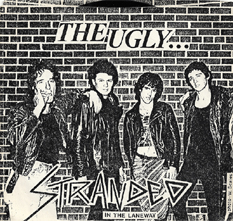 centre. He didn’t want his real name included in the book so he remains known as Mr. Shit.
centre. He didn’t want his real name included in the book so he remains known as Mr. Shit.
I also ended up asking around about a girl named Ruby T’s, who was a singer and also the girlfriend of a guy named Mike Nightmare, front man for a band called the Ugly. Ruby is also on the cover of The Last Pogo album, the cover of which has turned into an iconic Toronto punk image.
I kept getting different information on where Ruby had ended up. Some people said she moved out west. Some people had heard she had died. There were many rumours and a lot of speculation, but nothing definitive. Eventually, all of the question marks hovering over Ruby ended up in the narrative of TMLD. The answers I got about where she was ended up as part of the story.
While gathering the interviews did, you find yourself in situations that were unexpected. Tell us the sordid dirt…Liz!
Ha ha…nice question. One of the most unexpected situations was when Colin Brunton and Kire Paputts, who are working on a Toronto punk documentary called The Last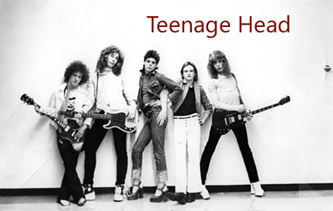 Pogo came over to my parents’ backyard in the suburbs to film an interview with Paul Kobak, Teenage Head’s original manager.
Pogo came over to my parents’ backyard in the suburbs to film an interview with Paul Kobak, Teenage Head’s original manager.
I’d been interviewing Paul for TMLD for several months by that point, going back and forth with some questions through email and eventually meeting in person. When he was asked to do an interview for the Pogo, he asked if I could be there, too. He was travelling in from west of Toronto and my parents’ place was a good meeting spot in between for everyone. It also has a big backyard and a lot of food.
It was a hot day and the interview was being shot outside. In the 1990s, Paul was president of the Canadian Society of Dowsers. For anyone who doesn’t know, dowsers can find water, gravestones, Ley lines, and other underground things using a dowsing rod. Colin Brunton asked Paul if he could give us a dowsing demonstration, so Paul made a dowsing rod out of a Bic pen and a wire hanger and started walking around the yard. He stopped under a tree and said there were three bodies buried there, dating back to the 1800s.
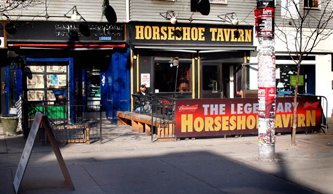
Colin asked if we could dig up the yard to find out if he’s right. My parents still aren’t sold on the idea. I’ll have to keep working on them for a while.
So yeah, that was one of the most unexpected things that happened. When you’re working on a project that has you hanging out with a bunch of old punks all day, you kind of assume that there’s going to be beer around, so any drunken rowdiness was just assumed. But dead bodies from the 1800s? No, I can’t say I saw that coming.
When the thought first germinated in your brain were you determined to see it finalized. Was there ever a time where you felt like quitting the project or did the project take a life of its own and steamroll itself into the hearts and minds of the 1977 punks?
If I ever felt like quitting the project, the feeling couldn’t have lasted long because I can’t remember any distinct considerations of abandoning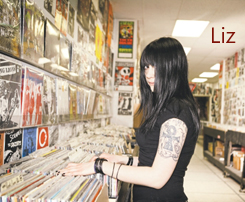 ship.
ship.
I certainly felt overwhelmed, though. For a while, the more interviews I did, the more work I realized I had to do. It just kept going deeper and deeper. I’d get to the end of the week and think, wow! I just got three more interviews done. And then a second later I’d think, shit! I only got three more interviews done. Because the more people told me, the more details would surface, which would lead to even more questions.
I also knew that because I was interviewing so many people, I was essentially involving all of them in the process. I’d also told many people that I was working on this project. So I knew that I had to finish this, because if I didn’t, I’d always be running into people who would ask how the book was going, or whatever happened to it, and the thought of having such a big, unfinished project hanging over me was worse than just doing all the work and seeing it through.
However, those overwhelming feelings didn’t dominate. Mostly, this project did take on a life of its own, absolutely. After a while, it just took over my life, and continues to, in many ways.
continues to, in many ways.
What is the next project that you are working on?
Aside from journalism, I do a lot of creative writing, and in the last few years I’ve been heavily focused on exploring surreal, strange, and experimental ideas. I’ve always had a lot of intense, vivid dreams, which tend to end up in a lot of my writing.
I’ve been combining dreams, real life experiences, hangovers, and old journal entries and turning everything into surreal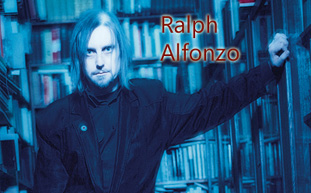 little pieces that will be published in 2011 as a poetry collection called Amphetamine Heart. It’s coming out through Guernica Editions in Toronto, so I’m currently working with my editor there to get that manuscript all wrapped up.
little pieces that will be published in 2011 as a poetry collection called Amphetamine Heart. It’s coming out through Guernica Editions in Toronto, so I’m currently working with my editor there to get that manuscript all wrapped up.
I’m also working on a rock ‘n’ roll horror novel. It’s based on an idea that came to me somewhere around 2005 when I was still in college and working part-time at a bookstore. I was stocking shelves on day and I got this idea for a story and filed it away. A year after that, I started working on TMLD. Throughout the years, my mind kept going back to this idea I had for a horror novel, and I kept thinking it was a good idea. That’s always how I know whether I should do, something is if I can come back to an idea weeks or months or years later and still get excited about it.
So earlier this year, after TMLD was released, I felt like I’d finally be able to focus on a big new project and decided that this novel was going to be the one.
Is Ralph Alfonso the hardest working person in 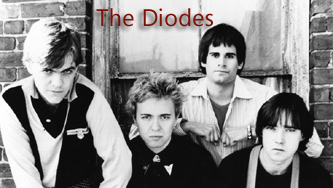 show biz?
show biz?
Ralph needs an intern or something. Half of the emails I get from him are sent at, like, 3:30 in the morning. He’s one of those people that always has something on the go and really puts a lot of work into keeping the Bongo Beat label going.
Whom would you vote as Toronto’s funniest punk…my vote would have to be John Hamilton!
Yeah, John Hamilton is a great storyteller.
Mickey DeSadist is pretty funny, too, but Pete Lotimer, aka Pete Treason, is also up there. He actually provided one of my favourite mental images from the book, which was when he told a story about throwing a carton of milk out of a car window and having it end up on a cop’s windshield.
Now that the final product has been out for sometime, would there be anything that you would like to change?
Probably, but that’s why I haven’t actually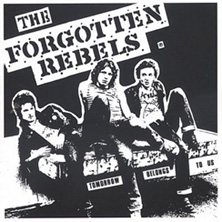 read the book since it came out. The last time I looked at it was before it went to print, when we were in our final proofreading stages.
read the book since it came out. The last time I looked at it was before it went to print, when we were in our final proofreading stages.
I did try to start reading it in January shortly after it launched, but I got maybe ten pages in before I started freaking out and I haven’t cracked it open since.
I am afraid of seeing things I would change, because I’m sure they’re in there. I guess it could be a good learning experience, to evaluate myself that way, but after working so long and so hard on something I don’t want to go there. We’re our own worst critics and I don’t need to invite my own opinions into the mix.
Okay some standard questions……..
Why was the Toronto scene never documented like the New York or Vancouver scene?
I don’t know. It just slipped under the radar for some reason. I don’t know if we have the same sense of history here that other cities do, although I think that’s beginning to change. Within the past decade, there’s been a strong movement to celebrate Toronto and explore the city in a whole new way. I’m hoping that movement has an influence on us uncovering more of the city’s alternative histories.
on us uncovering more of the city’s alternative histories.
I am curious why Simply Saucer was included in your book as they are normally cited as Proto Punk. There were also many bands around like The Daily Planet, Battered Wives etc that were largely seen, as the predecessors to punk-probably deemed more Pub Rock. Perhaps that is another book!
I’ll address the question of Saucer first: First, there were a lot of bands around at that time that wouldn’t be considered “punk” by today’s standards, but at the time, they were all lumped into that category anyway. Things were new, and the movement was in the moment. It’s in hindsight that a lot of these labels are attached.
However, you’re right; Saucer are normally cited as proto punk. So are Rocket from the Tombs. Even the Stooges have been cited as such. It hasn’t stopped them from being included in punk histories.
From the start, I had made the decision that Hamilton’s punk history was going to be included in TMLD. I think the Hamilton scene’s contribution has been really important, not only because they gave Toronto Teenage Head, but also because they gave the world Forgotten Rebels and Simply Saucer. Although a lot of people from the Toronto punk scene didn’t have the Rebels and Saucer on their radar, they do have fan bases outside of that original Toronto punk scene. They’ve grown beyond a lot of boundaries that other Toronto punk bands never got out of.
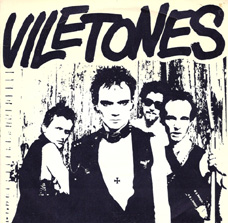
When I was talking to Mickey DeSadist and Chris Houston from the Forgotten Rebels, they talked about Simply Saucer a lot, and I soon realized that if I was going to make Hamilton a big part of this story, there was no way to leave Saucer out of it.
It helped that I liked Saucer’s story. I like that singer Edgar Breau slept in the band’s rehearsal space for a while. I like that they were trying something new and creative, and that creativity was important to them. My interviews with Edgar Breau also brought some interesting perspectives into the narrative. The band did play in Toronto, too, and so even though they weren’t big on the scene, they were still witness to what was happening and I wanted to share some of their insights through TMLD.
In terms of including the Daily Planet, Battered Wives, or other bands in great detail, I don’t know if it would have been possible, structurally. From the start, it was very important to me that TMLD have a story arc.
Because I was going into great detail on specific bands and following several years’ worth of their stories, I really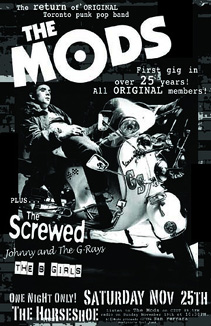 had to stay on track and stay focused on the bands I’d picked to profile in greater detail. And because the way I chose for the story to unfold relied a lot on overlap in the subjects’ personal narratives, relationships, and reference points, the story’s structure would have fallen apart if I drifted too far out in an attempt to include everyone.
had to stay on track and stay focused on the bands I’d picked to profile in greater detail. And because the way I chose for the story to unfold relied a lot on overlap in the subjects’ personal narratives, relationships, and reference points, the story’s structure would have fallen apart if I drifted too far out in an attempt to include everyone.
I had to draw a line somewhere in order to support the focus I was taking with TMLD.
So yes, that is another book. It would have to be, unless someone was working on an encyclopedia.
Why do you think it has taken the world 30+ years to catch up with the punks?
I don’t think it’s a case of the world just suddenly catching up with punk; it’s more that punk’s fan base grew with every generation. A lot of other subcultures grew out of punk, too, so the interest and longevity around punk and everything it spawned has had a cumulative effect when it comes to garnering interest.
There’s also a strong fascination with 1977, not so much as a calendar year but as an era. Punk’s first wave has been a prominent point of influence for a lot of new bands over the past ten years. There’s a lot of punk nostalgia going around, and it often comes from people were too young to have been there for when it all started.
Every once in awhile a little spark musically is created somewhere in the world. This was probably Toronto’s time in 1976-77. It does not seem apparent that we have ever been able to recreate that rich musical tapestry. Why do you think 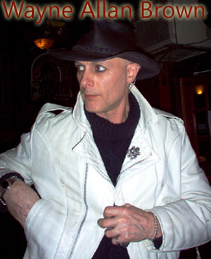 that is?
that is?
In a few words, describe the following people…….
Steve Leckie (Nazi Dog): Bizarrely endearing
Wayne Allan Brown: Gothic Cowboy
Mickey Skin: Proto riot grrl
Mickey DeSadist: A reason to go to Hamilton
Richard Lloyd: Oh my god
Frankie Venom: R.I.P.
Cynthia B Ross: Guarded
What motivated you to write the book?
When I found out that Toronto had birthed a punk scene, I was really interested in finding out what had happened. At the time of discovering bands like the Diodes and the Viletones, I was also really into UK punk bands like the Damned and the Clash, and through those interests, I’d been getting into the history around the punk movement. As time went on, I was trying to find out more and more about Toronto punk. I wanted to know what had happened here, but I found it very difficult because there was no other book about it. Therefore, after looking for so long for something about Toronto’s punk history, I just decided to find out for myself and put together the book that I wanted to read.
Therefore, I guess curiosity was the biggest motivation, but I was also a fan. I don’t think I would have been able to take on such a big project like this if I didn’t actually like the bands I was uncovering.
What sort of feedback have you received?
received?
What I’m happiest about is that I’ve had a lot of feedback from people of all different ages, and of all different interests, who have been able to dig into the story of TMLD. It was really important for me that this book be able to convey a story to people who don’t know anything about Toronto punk, because I wanted it to be accessible. I had a guy who was in high school come up to me at a signing and told me he was really into TMLD, and that’s when I knew the book was doing what I wanted it to.
There have been times I have been to amazing concerts in Toronto and they are very ill attended. One case in point was N Y Junk with Walter Lure. If someone is not told that the band is cool, they do not attend. Why don’t people think for themselves, what is the meaning of life, and how does music correlate into our lives.
I think Toronto can be a tough market. It’s a big, saturated music scene and there are shows going on every night, competing for people’s attention. There are some bands that seem to be able to get a lot of buzz and gather a crowd from that, but I think that’s happening a lot less now. About six or seven years ago, that seemed to be happening a lot more.
But why I think that’s happening though is people are getting burned out, and they’re also getting suspicious, even if there is a lot of hype. Because there are new bands being promoted all the time. Every magazine and website needs to throw a new cover story or feature interview at you on a regular basis. You can’t jump on every 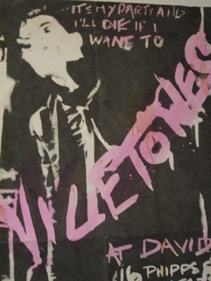 bandwagon, and you can only go to so many shows.
bandwagon, and you can only go to so many shows.
But that’s just my observation, I could be totally wrong.
Was there stuff that you were told not to include in your book?
No, nothing that I can think of.
Were you aware of the rivalry between Toronto bands before you began your project?
Ha ha, no, not all. That’s one of the things that took me most by surprise when I started working on it, actually. I had no idea that people would still be talking about them – and in some cases holding on to them – all this time after. It’s so different now; through the experiences that I’ve had and what I’ve noticed, I’ve seen so much cooperation between bands. And there was collaboration and support within the Toronto punk bands, but there was also a lot of competition. It’s hard to imagine that happening now. Maybe it’s because back then there was more at stake. Now, it’s so much easier to get yourself out there. There are more indie labels and more DIY options, and there’s a lot of information out there on how to make it all happen. In the ‘70s, those bands were just trying to figure all that out. They were paving the way for what we have  now.
now.